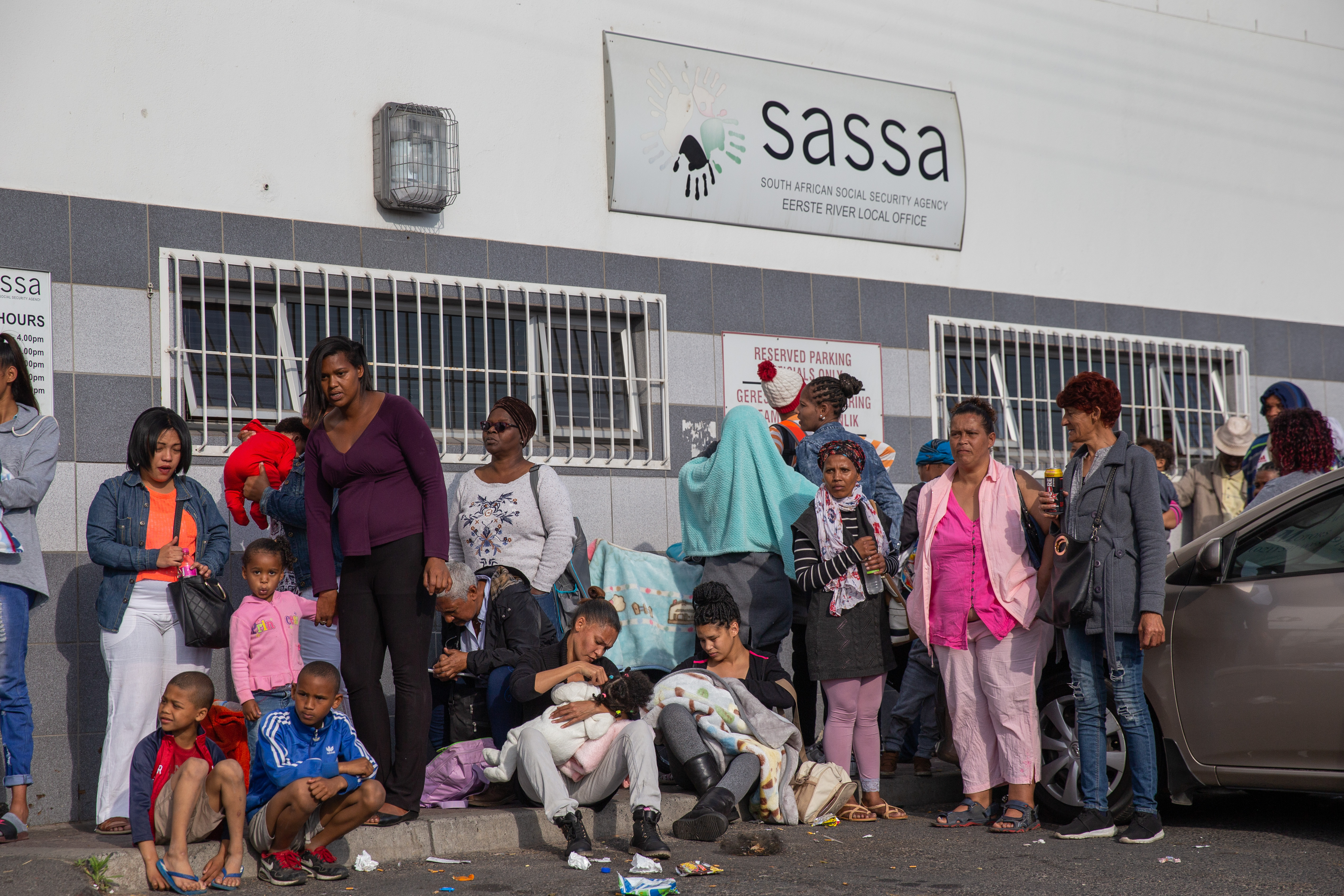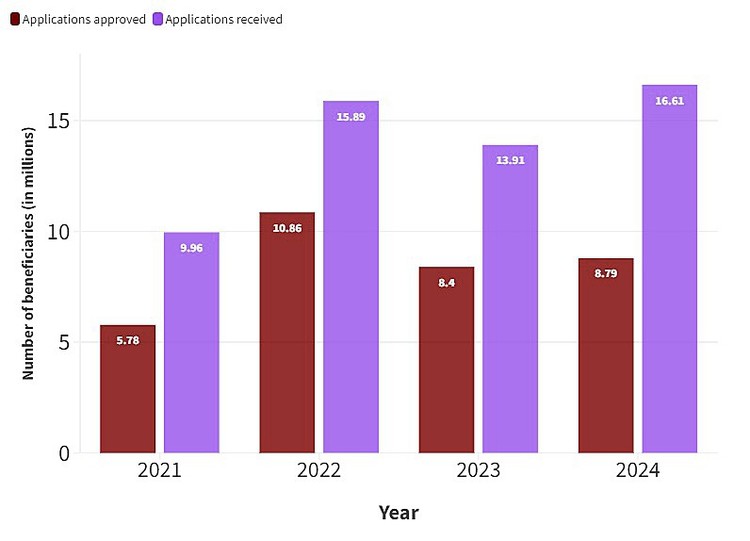Rules for R370-a-month social grant to be challenged in court in October
#PayTheGrants and the Institute for Economic Justice say regulations exclude many people who are eligible; government disagrees

Socal grant applicants queue at the Eerste River SASSA office. Archive photo: Ashraf Hendricks
- The Pretoria High Court is set to hear a case next month brought by #PayTheGrants and the Institute for Economic Justice (IEJ), challenging regulations to the R370 Social Relief of Distress (SRD) grant.
- They argue that current regulations on applications unfairly exclude eligible people and are unconstitutional.
- In response, the Department of Social Development (DSD), SASSA and the Ministry of Finance say the regulations are efficient and comply with constitutional rights.
A challenge to the rules for the R370-a-month Social Relief of Distress (SRD) grant will be heard in the Pretoria High Court on 29 and 30 October.
In 2023 #PayTheGrants and the Institute for Economic Justice (IEJ) filed an application at the Pretoria High Court to challenge regulations which they say exclude many eligible people from getting the grant.
The Minister of Social Development and the South African Social Security Agency (SASSA) have been listed as respondents in the application. The Minister of Finance is also a respondent.
The SRD grant was introduced in 2020 at the start of the Covid pandemic as an emergency measure to alleviate extreme poverty and hunger. It was to be paid for six months from May 2020 to October 2020, but each year since then, it has been extended. The grant was increased in April from R350 to R370 a month.
Only people earning up to R625 a month are eligible for the grant. Every month, SASSA monitors recipients’ bank accounts to check their income.
In the court application, #PayTheGrants and the IEJ argue that the government’s definition of “income” is too broad, since it includes financial support from family and friends. They want the court to rule that “income” should only be money received from employment, business activities or investments.
They also want the court to rule that the grant and income threshold for eligibility should be increased to take inflation and the cost of living into account.
They also challenge the way SASSA uses databases including those of SARS, the National Student Financial Aid Scheme and the Unemployment Insurance Fund, to verify income. They say some of the databases are inaccurate and want the court to declare the database verification unlawful and unconstitutional. They say bank verification does not consider fluctuations in the recipients’ income and want the court to prohibit bank verification.
Applications for the SRD grant can only be made online, unlike other social grants that can be applied for in person. The IEJ and #PayTheGrants say some applicants cannot access the internet and want the court to rule that in-person applications should be allowed.
They say the current appeal process does not allow an applicant for the grant to bring forward new evidence, and they want the appeal process to be declared irrational and unreasonable.
Government response
In his affidavit, Department of Social Development chief director of legal services Ebenezer Nkosinathi Dladla defended the online application system.
“The cell phone data does not even require data and one cellphone number can be used by five applicants,” he said.
“The process is so easy, in that all SRD applicants can choose their method of application being either the special SRD website which guides them with questions through the process or the WhatsApp channel which does the same. This process does not even take more than 20 minutes,” said Dladla.
He said the SRD grant was “one of the most successful” in the country. “The online method is the most effective and efficient,” he said. “The entire world is technologically transforming, so is South Africa”.
He said applicants without smartphones, “can use their family members, neighbours and peers’ cell phones”.
“The online application for the SRD is not complicated at all … if they are in the rural areas they can go to the tribal authority and or the community leader in the village to request assistance,” said Dladla
Dladla said the online process is easier than visiting SASSA offices and reiterated that a manual process would be “regressive” and delay timely assistance. He dismissed the unconstitutionality claims.
Source: SASSA
SASSA
In his affidavit SASSA executive manager Brenton van Vrede defended the use of government databases in the SRD grant verification system. This prevents “double-dipping” by applicants who receive funds from other government institutions and apply for the SRD grant.
He said that using multiple databases for verification is both “reasonable and necessary”.
SASSA verifies over 15-million SRD applications monthly, he said, and the number of approved beneficiaries ranges from 7.5-million to 8.5-million each month.
Van Vrede said SASSA has “limited human resource capacity” and adding manual processes could lead to staff strikes, which would harm those seeking assistance.
On the appeal process, Van Vrede said if an application is declined, applicants can appeal on the DSD’s website, with a turnaround time of 90 days. If the appeal is successful, SASSA will process the payment.
He also dismissed the claims of unconstitutionality by the applicants.
Treasury
In his affidavit, Treasury then acting director-general Edgar Sishi said the regulations do not violate the constitutional right to social security. “They facilitate greater access to social security,” Sishi argued, “and provide as much coverage and protection to the most vulnerable South Africans that the state can afford at the moment.”
He cautioned that any court order invalidating the regulations could have “disastrous economic consequences”. Any such order should be suspended to allow the DSD minister to address issues without causing budgetary strain.
Support independent journalism
Donate using Payfast

Don't miss out on the latest news
We respect your privacy, and promise we won't spam you.
Next: Survivors mark anniversary of tragic Marshalltown fire
Previous: Journalist fled Gaza to save her family
Letters
Dear Editor
The application process should be more clearly looked at.
I stood in the line at a retailer. In front of me were two women with children. They were talking about how high and drunk they were the night before. The SRD was going to help with the hangover and withdrawal. One of the children told the mom he was hungry, to which she responded where the f--k p--s was she get money for food. So, the money goes directly to their habits instant of food, so does the children grant.
So please, we need to do more when applications are made. Some of these people or youth have never work in their live and most of them are drug uses. Drug screens should be done.
Dear Editor
The article provoked a few thoughts, especially the statement about adding manual processes might provoke SASSA employees to complain.
But, more importantly, what is the cost of processing and rejecting an application?
Considering the size of the benefit, would it not be best just to pay those that provide a completed application? Of course, this leads one to think of the benefits, effectiveness and efficiencies of a Universal Social Grant unencumbered by bureaucratic processes.
The cost of compliance to police requirements is quite likely many times higher than the cost of the benefit.
Just hand it out…
Dear Editor
Please increase the money... We as the unemployed need it. I'm not only talking on my behalf but of the masses. We cannot survive on that kind of money but need more.
Dear Editor
I think a good solution would be for people to visit SASSA branches in person. Some people are having their SRD grants unfairly declined, with reasons like receiving UIF when they don’t, or sometimes no reason at all. Plus, some don’t have phones or can’t read and need help. It was easier when grants were collected at the Post Office because they could just bring their ID books.
Dear Editor
Can SASSA kindly explain their method of verification? In my case I realise that every year in August I don't get the money because of "source of income". Even if you can make an appeal, you will never get the money. How do I get it and suddenly my status changes on their side? I am not working nor have any source of income!
Dear Editor
I completely agree—take them to court! It’s all just lies. I’ve been appealing my declines since 2022. They say you can’t have more than R620 going into your bank account, but my family deposits small amounts to help me survive because the grant isn’t enough. Yet, they still decline me. Even before my family started helping, I was getting declined, and when I appealed, they just let 90 days go by. Then, they tell you that if you want to appeal again, it’s outside the 90-day turnaround time. I’ve emailed them, and all I get is “we have a backlog.” It’s just a bunch of lies. I have a 7-year-old who depends on this money. I really hope you take SASSA to court and win—they’re just eating the money.
Dear Editor
I applied in April 2024 and only received my first SRD payment in June 2024.
Payment was made for June, July and August but stopped without any reasons or notice by SASSA.
I am currently without any income and/ or employment and have not received any additional income during the past 6 months which can be verified through my bank account. Please help me by enquiring from SASSA on my behalf. I am in desperate need of these funds to buy basic necessities including food for my family and dog.
Dear Editor
Income should only include money received from employment, business activities, or investments. The R625 we receive comes from our families or friends who are trying to help since we’re not working.
Dear Editor
In the last few days, I applied for the SRD grant but they will only pay the money into a bank account, which I don't have. Not all of us have bank accounts. I want to get money from a store but I cannot. They are insisting I get it from a bank. I need this money badly – do they not consider other people? Right now I eat porridge day and night. My neighbour just received his. It sent a message right to his phone so why is mine failing?
© 2024 GroundUp. This article is licensed under a Creative Commons Attribution-NoDerivatives 4.0 International License.
You may republish this article, so long as you credit the authors and GroundUp, and do not change the text. Please include a link back to the original article.
We put an invisible pixel in the article so that we can count traffic to republishers. All analytics tools are solely on our servers. We do not give our logs to any third party. Logs are deleted after two weeks. We do not use any IP address identifying information except to count regional traffic. We are solely interested in counting hits, not tracking users. If you republish, please do not delete the invisible pixel.

